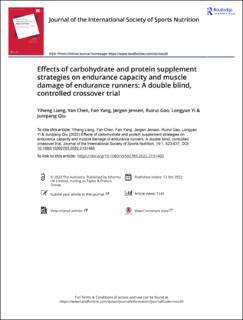| dc.contributor.author | Liang, Yiheng | |
| dc.contributor.author | Chen, Yan | |
| dc.contributor.author | Yang, Fan | |
| dc.contributor.author | Jensen, Jørgen | |
| dc.contributor.author | Gao, Ruirui | |
| dc.contributor.author | Yi, Longyan | |
| dc.contributor.author | Qiu, Junqiang | |
| dc.date.accessioned | 2023-01-11T08:31:23Z | |
| dc.date.available | 2023-01-11T08:31:23Z | |
| dc.date.created | 2022-11-11T10:56:15Z | |
| dc.date.issued | 2022 | |
| dc.identifier.citation | Journal of the International Society of Sports Nutrition. 2022, 19(1), Side 623-637. | en_US |
| dc.identifier.issn | 1550-2783 | |
| dc.identifier.uri | https://hdl.handle.net/11250/3042555 | |
| dc.description | This is an Open Access article distributed under the terms of the Creative Commons Attribution License (http://creativecommons.org/ licenses/by/4.0/), which permits unrestricted use, distribution, and reproduction in any medium, provided the original work is properly cited. | en_US |
| dc.description.abstract | Background: The purpose of this study is to explore the effect of carbohydrate only or carbohydrate plus protein supplementation on endurance capacity and muscle damage.
Methods: Ten recreationally active male runners (VO2max: 53.61 ± 3.86 ml/kg·min) completed run-to-exhaustion test three times with different intakes of intervention drinks. There was a 7-day wash-out period between tests. Each test started with 60 minutes of running at 70% VO2max (phase 1), followed by an endurance capacity test: time-to-exhaustion running at 80% VO2max (phase 2). Participants randomly ingested either 1) 0.4 g/kg BM carbohydrate before phase 1 and before phase 2 (CHO+CHO), 2) 0.4 g/kg BM protein before phase 1 and 0.4 g/kg BM carbohydrate before phase 2 (PRO+CHO), or 3) 0.4 g/kg BM carbohydrate before phase 1 and 0.4 g/kg BM protein before phase 2 (CHO+PRO). All subjects ingested carbohydrate (CHO) 1.2 g/kg BM during phase 1, and blood samples were obtained before, immediately, and 24 h after exercise for measurements of alanine aminotransferase (ALT), aspartate aminotransferase (AST), creatine kinase (CK), and myoglobin (MB).
Results: There was no significant difference in time to exhaustion between the three supplement strategies (CHO+CHO: 432 ± 225 s; PRO+CHO: 463 ± 227 s; CHO+PRO: 461 ± 248 s). However, ALT and AST were significantly lower in PRO+CHO than in CHO+CHO 24 h after exercise (ALT: 16.80 ± 6.31 vs. 24.39 ± 2.54 U/L; AST: 24.06 ± 4.77 vs. 31.51 ± 7.53 U/L, p < 0.05). MB was significantly lower in PRO+CHO and CHO+PRO than in CHO+CHO 24 h after exercise (40.7 ± 15.2; 38.1 ± 14.3; 64.3 ± 28.9 ng/mL, respectively, p < 0.05). CK increased less in PRO+CHO compared to CHO+CHO 24 h after exercise (404.22 ± 75.31 VS. 642.33 ± 68.57 U/L, p < 0.05).
Conclusion: Carbohydrate and protein supplement strategies can reduce muscle damage caused by endurance exercise, but they do not improve endurance exercise capacity. | en_US |
| dc.language.iso | eng | en_US |
| dc.subject | endurance exercise | en_US |
| dc.subject | fatigue and recovery | en_US |
| dc.subject | sports beverage | en_US |
| dc.title | Effects of carbohydrate and protein supplement strategies on endurance capacity and muscle damage of endurance runners: A double blind, controlled crossover trial | en_US |
| dc.type | Peer reviewed | en_US |
| dc.type | Journal article | en_US |
| dc.description.version | publishedVersion | en_US |
| dc.rights.holder | © 2022 The Author(s) | en_US |
| dc.source.pagenumber | 623-637 | en_US |
| dc.source.volume | 19 | en_US |
| dc.source.journal | Journal of the International Society of Sports Nutrition | en_US |
| dc.source.issue | 1 | en_US |
| dc.identifier.doi | 10.1080/15502783.2022.2131460 | |
| dc.identifier.cristin | 2072350 | |
| dc.description.localcode | Institutt for fysisk prestasjonsevne / Department of Physical Performance | en_US |
| cristin.ispublished | true | |
| cristin.fulltext | original | |
| cristin.qualitycode | 1 | |
